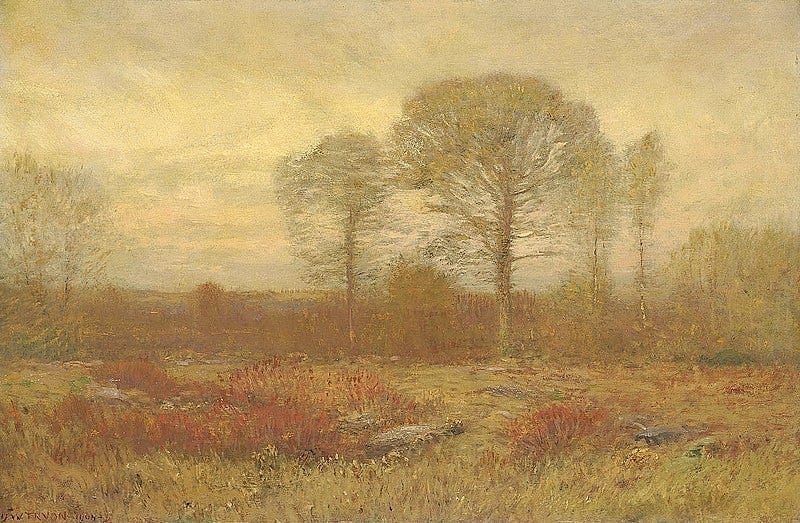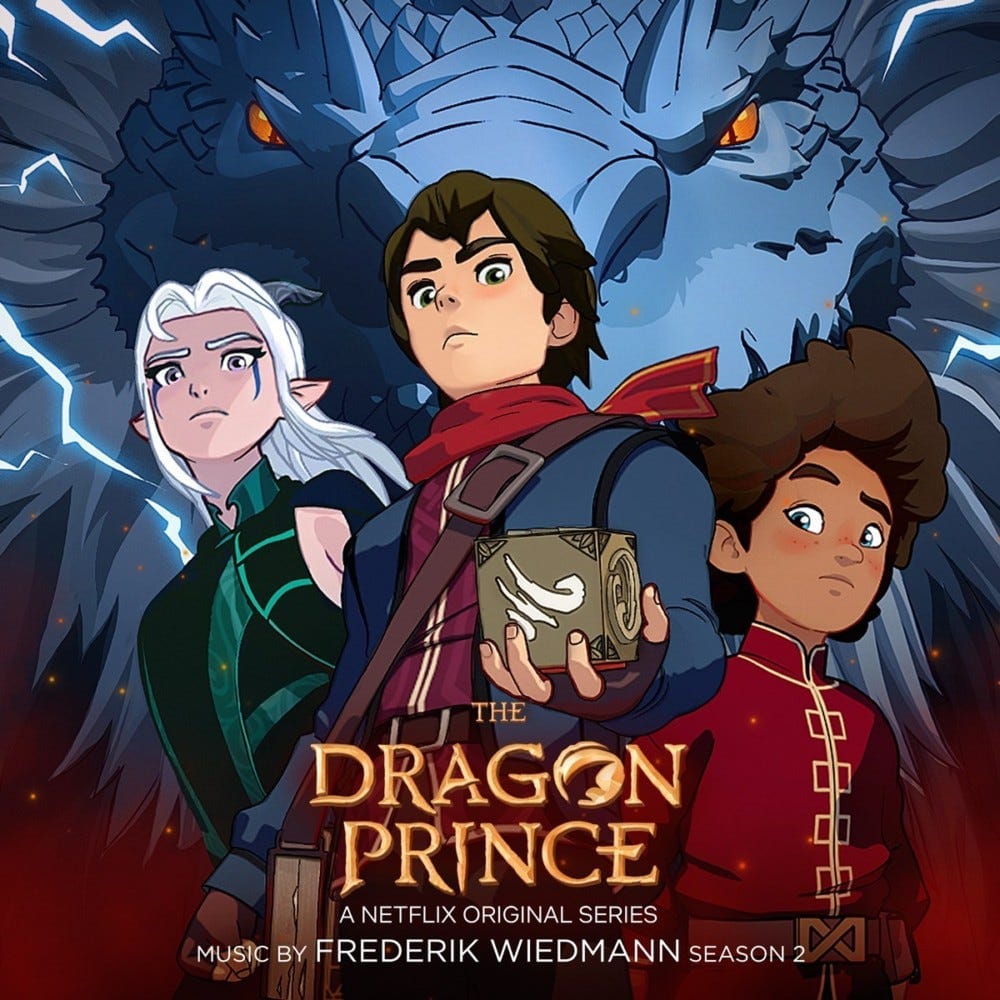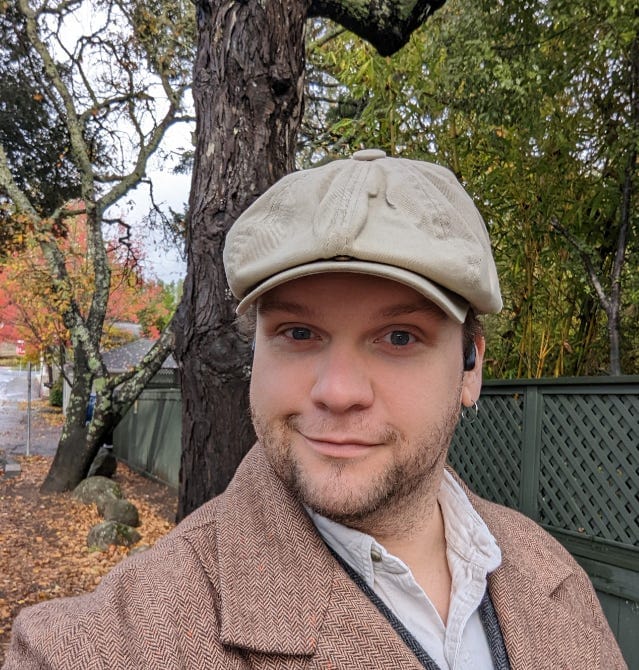As Autumn Turns to Winter
An excerpt from my novel, new articles, good things in the anti-corporate world, and my favorite media of the week!

Hello, dear friends and readers, all!
It warms my heart to see so many people reading my newsletter. I’ve had new signups from around the world, and I’ve even been blessed with my first paid subscriber! That was an incredibly moving surprise. I’d always hoped that people would like to support me through my writing, but to have that happen so soon was wonderful.
Katie was sick all last week with an awful sinus and bronchial cold, and she’s still fighting it. Luckily, she was able to take the week off work, something too few Americans have the ability to do when ill. Of course, I am now also sick, though not as sick as she was (knocking on wood).
I’m working on fine-tuning the structure of these newsletters, and their shape and contents will likely continue to evolve over the course of the next year.
Media Recommendation: The Dragon Prince

I am persnickety about a lot of popular TV and movies. On one hand, I was a dedicated film student for years who loved studying film history and film theory. I can watch a wide variety of material and enjoy it on various levels, from the technical (“Wow, it’s cool how they shot that scene”) to the personal (“Wow, this really moves me emotionally”). But… I don’t like Game of Thrones, I don’t like Breaking Bad, and the last season of Legend of Korra is so painfully bad I can only watch it by using the ten-second-skip button (I still like season one and enjoy the overall aesthetic, though, and the music is gorgeous).
One of my all-time favorite shows, however, is Avatar: The Last Airbender. The plot is superb, and the characters are incredibly poignant. Plus, the old school 20-episode seasons allowed for so much more storytelling than the modern 8-12 episode seasons that streaming services like to pay for. It’s a favorite of mine to re-watch, partly because it’s so careful about portraying reverence for life. It can also be silly and zany in a delightful way, and I like that mixture of profound and whimsically comical.
I haven’t found another show that’s as good as Avatar… but I have come close in The Dragon Prince. Which makes sense, since they’re created by the same team!
Katie and just finished the newly released season 4 of The Dragon Prince, and I’m happy to say that it’s as good as the earlier episodes. There’s a strong focus on the theme of good communication skills, forgiveness, and restorative justice rather than punitive justice. It’s not as perfect as Avatar, but it sure wets the whistle if you’ve hankering for something similar.
My Writing This Week
Work on my novel has been going well! I haven’t been hitting the National novel Writing Month word count (1667 words per day) due to overwhelm and illness, but I’ve been getting close. Currently, I need around 1800 words per day to hit that goal. Last night I actually did hit that, after a sudden burst of inspiration. However, the writing itself is the important thing! I’m pleased with this new stab at my novel, the plot has long given me difficulty, but it’s coming together well. Aided by one of my main characters finally displaying some backbone!
And, I actually want to share a little snippet of the novel with you today! This is an unedited first draft of a passage I wrote this last week, and it was fun to watch the story develop on the page.
But then the prince made a gesture, and Thyra smiled. “He wants to know your name.”
Ekateralia stared first at Thyra, then at the prince. “How did you do that?”
Thyra’s brow arched. “Have you never seen anavepikonia before? The prince is well versed in dvergen hand-speech.”
The fidgeting! Ekateralia felt a sudden heat flush her cheeks. She’d been an idiot. Perhaps, if she had spent more than two seconds to stop and think, she would have been able to communicate something with him before now. “Ekateralia,” she said.
The Abbess made a complex series of gestures, and the prince smiled. His fingers danced in response.
“Prince Ospin is very grateful. Without you, he knows he would not have survived the assassins.” Thyra glanced back at the prince, who was making another series of signs with his hands. “And for those men who found you both in the burning fort.”
“Those soldiers, they were after him this whole time?” Protect the boy. The words rang in her mind.
“They were, yes. And that is troubling in many ways. But do not worry, I’ve sent for help. One question does not have so clear an answer. Who are you, and where have you come from?” Thyra moved closer, and suddenly reached out. She clasped the sides of Ekateralia’s head, her grip not painful, but very strong, and she pulled back Ekateralia’s long hair. “And how it is you bear this profane mark upon your skin?”
Dun dun, dah dunnnnnn.
Microfiction

Microfiction is an ultra-short fiction form. In my case, I restrict myself to 100 words. It’s about playing with ideas and language, first and foremost, so I don’t spend a lot of time editing and overthinking these.
I also think of these as writing prompts for other people! My hope is that they’ll be useful to other writers who want prompts to help them kick writer’s block, try on a different style, or just have fun.
- Darkness Is a Deed “If I live,” he whispered, “darkness will swallow the world.”
- Headlights, Headlights on the Road Asphalt beneath his shoes, slick as blood, black as coal.
- When the Wounded Don’t Heal, the World Burns “They refuse to hear us,” Saufin told him. “So we’ll make them.”
- Flee Even in the middle of the greatest danger, sie could not let an innocent being die.
- A Choice to Love “It’s not about right or wrong! It’s not about what’s allowed.”
My Articles on Medium, and thoughts about technology
This week, a bunch of my articles focused on the massive migration away from the Twitter social network toward a social media platform called “Mastodon.” Elon Musk purchased Twitter, immediately fired the people responsible for public safety, and then proceeded to let go another 4,000 employees. Immediately, the platform of 240 million saw a dramatic increase in open hate speech against minorities, such as neo-fascists openly using racial slurs and crowing about how “free speech” was finally established.
In light of this, many people decided to leave. Mastodon already featured accounts for governmental bodies, like the European Union and a number of French and German cities, towns, and other agencies. Following the great exodus from Twitter, prominent journalists, political figures, and entertainers (including Neil Gaiman) joined as well. But, with over 100,000 people per day joining Mastodon, there was a lot of confusion about how Mastodon works.
My articles cover a lot of the differences in the simplest terms, so I won’t re-elaborate here. Instead, I’m going to illustrate why this confusion exists… because that confusion is tied to deeper problems in our society.
Simply put, people have become used to using the Internet through only those narrow channels that powerful businesspeople and corporate interests control. This is not necessarily the fault of the average person: because most people never had education in philosophy to tell them different.
Technology can be a wonderful thing! But it can also have considerable downsides. This is what I’ll to explore today.
Gavin Newsom wrote a book in 2013 called Citizenville (you can read it here) in which he outlined a lot of his thinking on social reform, politics, and technology. He specifically focused on initiatives to use technology more effectively in the government.
Given the speed at which tech has developed, the issues faced by our society, and the slowness of government to adopt people-friendly solutions… the core of Newsom’s arguments made sense. Technology could change lives for the better, solve problems the government had struggled with for years, and save crucial money that could be then funneled toward important goals like fighting climate change. Only, Newsom made one huge mistake.
His thesis was that, because the government seemed incapable of building and maintaining software solutions, even for its own internal systems, this was a problem that should be outsourced to corporations. After all, as Newsom’s argument went, the tech giants were experts at not only building great software everyone could use… they were experts at getting it into people’s hands. Newsom looked joyously upon a “gamified future” where social issues could be solved through candy-crush-esque apps.
Never once in his nearly 300-page book did Newsom mention any reservations about handing tech giants the keys to the kingdom. Since 2013, we’ve seen a remarked rise of the use of technology in schools, all the way down to kindergarten (one well-known study shows how detrimental touchpads are for young children, and it’s by no means the only one out there). There are even teacher training programs in California that require the use of iPhones, iPads, and Macs because they have been sponsored by Apple. You can’t become a teacher without buying in.
There are partial successes, too, like the for-profit company Propel’s Providers app, which helps low-income Americans easily access services (like food stamps). The fact that this process is easier is great. The fact that the process is mediated by a for-profit company is really not great. That’s because there’s an inherent conflict of interest between providing a public service for the greater good and making profit. And, ultimately, the causes of the original complexity are inherent in the crummy way we treat all our citizens, for which there’s no easy technological fix.
Still, Newsom’s general instinct was spot-on. Technology can improve lives . Our social systems and government are painfully slow to evolve and adapt. But technology that is designed first and foremost to capture profit can not, and can never be, in alignment with the public good. Why? Because the first and most important goal of any capitalist organization is to maximize profit. And any social or environmental costs in the short term are absolutely acceptable from that point of view.
Articles regarding social Media
This is where we find ourselves back with Mastodon. Because, while Twitter, Facebook, Instagram, and TikTok are all corporate entities that treat human lives like products, Mastodon is an open-source, non-profit initiative that puts power directly into the hands of the people who use it.
The following three articles go into a lot more detail about what Mastodon is and why it’s so nifty, especially when compared to corporate-owned platforms. I hope you’ll give at least the first two a read, and if you decide to join Mastodon for yourself, my compassionate guide will walk you through the process, easy as baking a pie.
- Myths About Mastodon
- Mastodon is More Exciting than Twitter
- The Compassionate User’s Guide to Mastodon There are plenty of “idiots guides” but what about a guide that’s kind?
- Tired of Twitter? Try these Social Media Alternatives! (Okay, so this one is aimed at a really generic audience, but I wanted to get it into as many eyes as possible).
Compassion, Zen, and Stoicism
I didn’t just write about social media this week, I promise. I also wrote a piece inspired by my work with mindfulness and meditation. My relationship with meditation communities has been a complex one, since I’m anarchistic in tendencies (which means I’m highly aware of, and antagonistic toward, unfair and cultish power structures). And yet, the greatest positive developments in my life have been due to a search for self-awareness and self-betterment.
This journey began with my studies of Joseph Campbell in my early 20s, continued through my time working for a Zen Buddhist organization, and also my long-time commitment to the exploration of Stoicism. (I’ve lately been re-reading Marcus Aurelius and Hero with a Thousand Faces, so expect stuff from those in the months ahead!).
I mentioned in my last Newsletter that I’d begun listening to the Plum Village podcast. That’s been a major source of comfort to me during the last couple of weeks while both Katie and I have struggled with this strange bronchial/sinus sickness. The teachings described in Thích Nhất Hạnh’s work are ones I frequently identify with. This podcast, combined with a great re-watch of Avatar: The Last Airbender, inspired this next piece.
- Hate is Always Hate When anger leads to hate, it doesn’t matter if the anger is justified.
News from the world and the web
Well, we wrapped up the 2022 midterm election. While things aren’t spectacular, the feared “Red Wave” failed to occur, and a huge number of Trump-backed neo-fascist candidates lost. We won’t have decisive news on this until next week, but it’s looking a lot better for the Democrats than it usually does, especially with former astronaut Mark Kelly’s big win. We’ll see what the next year brings.
The war in Ukraine continues, with Ukrainian forces doing well against the Russian invasion. Banksy placed a mural on a wrecked building in Ukraine, and it’s a stark reminder of what this war of aggression has cost so many.
And, on a lighter note, this nearly 4,000-year-old hair comb is inscribed with a prayer against lice. Some things about being human remain the same.
From social media
Firstly, This lovely image post on Tumblr will make you hungry for Anime food. I discovered the Egyptian goddess of books through someone on Mastodon, and Katie shared some lovely material on her Instagram. And here’s a great thread on Twitter about some more of the big stuff (arts/rights/and corporations).
And, so I don’t leave you on a heavy note in social media land… here is some autumnal adorableness.
love in autumn🍁
— Anna-Laura🍁 (@annalaura_art) 8:40 PM ∙ Nov 8, 2022
Technology
If you thought that Mastodon was going to take up my technology segment today, you were mistaken sir, gravely mistaken!
I want to introduce you to something Incredible. The Weird Old Book Finder.
Built by a software engineer named Clive Thompson as a way to “rewild your attention,” this incredible search engine finds random books from long, long ago and pulls them up for you to read. It’s an absolute treat. Even if you don’t read all the books you come across, just dipping your toe into a few pages of a work from the mid-1800s is a special sort of fascinating.
I’m also going to share with you an older post I wrote for Medium. It’s a short book review for a great introductory text on understanding Internet privacy and security called Firewalls Don’t Stop Dragons. Even better, listen to the podcast of the same name. I don't intend to alarm anyone, but Internet security is more important now than ever before, and it’s getting more vital all the time.
Self-Care
Between immediate stresses like being ill and big world stresses like the midterms, self-care can often go out the window. The biggest thing I’ve been doing is making sure I take a minimum half hour walk every day (aiming for 7,000 daily steps). Walking without stopping is a good, low-impact, way to improve fitness and cognition. Of course, since I’ve been feeling like someone’s jammed a giant cotton ball up behind my eyes the last few days, I haven’t been up to strolling around outside.

To ensure that this period of illness doesn’t undo my good work, I’ve reduced my calorie intake while sick. A big bowl of congee (rice porridge) in the morning, tons of tea throughout the day, and a lovely soup for dinner are just what the doctor ordered. Learning to eat intuitively is hard. What I want right now is about fifteen cheese sandwiches and a chocolate cake. Learning to accept these impulses without judgment, and not give into them, is a giant part of learning to give oneself good care.
I’m also continuing my mindfulness work. While sick, it’s often hard to fight feelings of overwhelm, depression, and anxiety… which makes taking care of your mental wellbeing even more vital than usual.
Mindful breathing exercises while sick are hard, but did you know that you can practice mindfulness whenever you blow your nose? Coming back to the present moment takes practice, but it does improve everything.
Well, that’s it for this week, folks. I hope you’ve enjoyed this. As I said, I’m evolving how I present this newsletter, as well as how I go about completing projects throughout the week. I’m always happy to hear your thoughts and feedback in the comments section—or just your support! You can also “heart” this newsletter to let me know you enjoyed it.
As I mentioned: one wonderful person opted to subscribe to this newsletter via a paid plan. Your support allows me to put more time and energy into what I love, through the various projects I undertake in the world. If you have the ability, subscribing via a paid plan is a great way to go.
Until next week! Go easy, and, if you can’t go easy… go as easy as you can.

